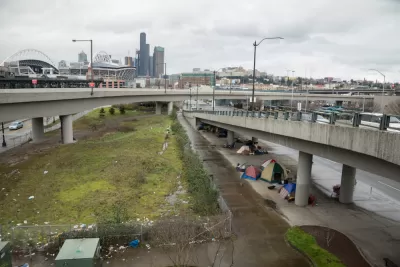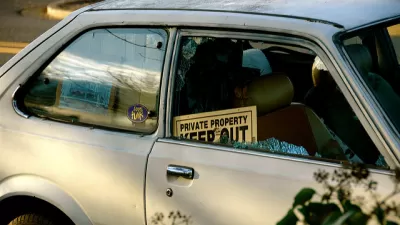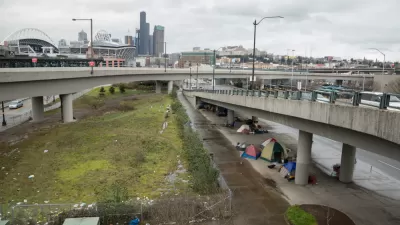The city has proposed a "safe lot" for homeless residents living out of their cars, but the cost could run above $1,000 a person.

Seattle Times Columnist Danny Westneat weighs in a proposed "safe lot" in Seattle, "where homeless folks living in their cars can park off the street for the night."
The "safe lot" idea has been germinating in Seattle for a long time already, but now that the official proposal is here, it's mostly an example of government overspending, according to Westneat.
"Only this being Seattle, it’s projected to cost the city $382,000. That’s for overnight parking in one lot in the U District, holding 20 to 30 cars. Which means each spot would cost $1,000 to $1,500 a month – in the ballpark of what it costs to rent a studio apartment."
Westneat traces the origin of the idea, back to his own involvement in a story on the subject 15 years ago, and notes the other cities around the country that have implemented a similar program. (On that latter point, San Francisco is the most recent city to propose such a lot.)
"We don’t even have to travel to California to learn how," writes Westneat to explain that it should be much cheaper and easier to implement this idea. "Lake Washington United Methodist Church in Kirkland has been hosting up to 55 car-campers per night in its church parking lot since 2011 – which makes it one of the largest providers to the vehicular homeless on the West Coast."
For an indication of why the difference in cost arises, Westneat notes that the church uses volunteer labor, while the city will have to staff 24-hour security to appease neighbors.
FULL STORY: Parking spots for the homeless in Seattle, finally. But at a thousand bucks a month?

Planetizen Federal Action Tracker
A weekly monitor of how Trump’s orders and actions are impacting planners and planning in America.

San Francisco's School District Spent $105M To Build Affordable Housing for Teachers — And That's Just the Beginning
SFUSD joins a growing list of school districts using their land holdings to address housing affordability challenges faced by their own employees.

The Tiny, Adorable $7,000 Car Turning Japan Onto EVs
The single seat Mibot charges from a regular plug as quickly as an iPad, and is about half the price of an average EV.

Seattle's Plan for Adopting Driverless Cars
Equity, safety, accessibility and affordability are front of mind as the city prepares for robotaxis and other autonomous vehicles.

As Trump Phases Out FEMA, Is It Time to Flee the Floodplains?
With less federal funding available for disaster relief efforts, the need to relocate at-risk communities is more urgent than ever.

With Protected Lanes, 460% More People Commute by Bike
For those needing more ammo, more data proving what we already knew is here.
Urban Design for Planners 1: Software Tools
This six-course series explores essential urban design concepts using open source software and equips planners with the tools they need to participate fully in the urban design process.
Planning for Universal Design
Learn the tools for implementing Universal Design in planning regulations.
Smith Gee Studio
City of Charlotte
City of Camden Redevelopment Agency
City of Astoria
Transportation Research & Education Center (TREC) at Portland State University
US High Speed Rail Association
City of Camden Redevelopment Agency
Municipality of Princeton (NJ)





























